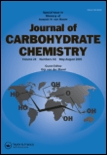
JOURNAL OF CARBOHYDRATE CHEMISTRY
Scope & Guideline
Unlocking the Potential of Carbohydrates.
Introduction
Aims and Scopes
- Carbohydrate Synthesis:
The journal highlights various synthetic methodologies for carbohydrate derivatives, including stereoselective glycosylation, one-pot reactions, and novel catalytic systems. - Biological Applications of Carbohydrates:
Research that explores the role of carbohydrates in biological systems, including their use in vaccine development, immunology, and interactions with biological receptors. - Characterization Techniques:
The journal publishes studies that employ advanced characterization techniques like NMR, MS, and molecular dynamics simulations to elucidate the structures and dynamics of carbohydrates. - Natural Polysaccharides and Their Modifications:
Research on the extraction, modification, and application of natural polysaccharides, focusing on their properties and potential biomedical applications. - Innovative Carbohydrate-Based Materials:
Studies on the development of new materials based on carbohydrates, including hydrogels and nanomedicines, emphasizing their structural and functional properties.
Trending and Emerging
- Stereoselective and Chemoenzymatic Synthesis:
There is a notable increase in studies focusing on stereoselective synthesis and chemoenzymatic approaches, which offer more precise control over glycosidic bond formation and the production of complex carbohydrates. - Carbohydrates in Vaccine Development:
Research into the role of carbohydrates in vaccine development, particularly in the context of synthetic glycoconjugates for immunogenicity enhancement, is gaining momentum. - Carbohydrate-Protein Interactions:
Emerging studies on the interactions between carbohydrates and proteins, including the use of glycosylation to modulate protein function, are becoming increasingly prevalent. - Nanotechnology and Carbohydrate Applications:
The application of nanotechnology in carbohydrate research, particularly in drug delivery and nanomedicine, is showing significant growth, reflecting an interdisciplinary trend. - Sustainable and Green Chemistry Approaches:
An increasing focus on sustainable practices in carbohydrate chemistry, including the development of greener synthesis methods and the use of renewable resources, is becoming a defining theme.
Declining or Waning
- Traditional Glycosylation Methods:
As novel and more efficient glycosylation techniques gain popularity, traditional methods are being reported less frequently, indicating a shift towards more innovative approaches. - Basic Carbohydrate Chemistry:
Basic studies focusing solely on fundamental carbohydrate chemistry without clear applications or advanced methodologies are appearing less often, as the journal increasingly favors research with practical implications. - Explorations of Simple Carbohydrate Derivatives:
Research centered on straightforward carbohydrate derivatives with limited complexity or novelty is declining, as there is a growing interest in more complex and biologically relevant structures.
Similar Journals
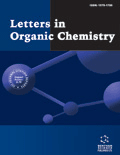
LETTERS IN ORGANIC CHEMISTRY
Fostering Dialogue for Future InnovationsLETTERS IN ORGANIC CHEMISTRY is a distinguished journal published by Bentham Science Publishers Ltd, focusing on the rapidly evolving field of organic chemistry. Established in 2005, the journal commits itself to disseminating vital research findings, reviews, and innovative methodologies that contribute to the understanding and advancement of organic chemistry and biochemistry. With an ISSN of 1570-1786 and an E-ISSN of 1875-6255, this journal enhances accessibility and visibility for authors and readers alike, albeit not adopting an open-access model. Positioned within Q4 quartile rankings for both Biochemistry and Organic Chemistry, it serves a niche audience keen on exploring emerging trends and breakthroughs in these disciplines. Its Scopus rankings further reflect its role in the global academic landscape, albeit at the beginning stages of its impact journey. Based in the United Arab Emirates, LETTERS IN ORGANIC CHEMISTRY is dedicated to fostering dialogue among researchers and practitioners, paving the way for future innovations in organic and biochemical sciences.

MAIN GROUP CHEMISTRY
Illuminating the Path of Chemical Science ProgressMAIN GROUP CHEMISTRY, published by IOS PRESS in the Netherlands, is a dedicated journal that serves as a platform for advanced research in the fields of inorganic, organic, and materials chemistry. With an ISSN of 1024-1221 and an E-ISSN of 1745-1167, this journal caters to a diverse audience, including researchers, professionals, and students aiming to expand their knowledge and understanding of the main group elements and their compounds. Over the years, MAIN GROUP CHEMISTRY has played a pivotal role in showcasing significant findings that push the boundaries of current knowledge, despite being categorized in the Q4 quartile for all three covered fields as of 2023. While not an open access journal, it still provides vital insights and fosters discussions that contribute to the advancement of chemical science. With an evolving publication history since its inception, the journal continues to thrive as a valuable resource in a competitive academic landscape.
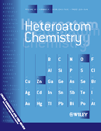
HETEROATOM CHEMISTRY
Unlocking the Potential of Heteroatoms in Organic ChemistryHeteroatom Chemistry is a prominent open-access journal dedicated to advancing the field of heteroatom chemistry, with a particular focus on the chemistry of elements other than carbon in organic compounds. Published by Wiley-Hindawi, this journal provides researchers, professionals, and students with a platform to disseminate and access novel research findings related to the synthesis, properties, and applications of heteroatom-containing compounds. Since its inception in 1990 and gaining open access status in 2019, the journal has fostered academic collaboration and innovation throughout its converged years, although it currently holds a category quartile ranking of Q4 in Chemistry (miscellaneous) and ranks #319 out of 408 in general chemistry within Scopus. With its commitment to high-quality research and broad accessibility, Heteroatom Chemistry is poised to be an essential resource for anyone looking to explore the rich and varied applications of heteroatom chemistry in diverse scientific fields.

Moroccan Journal of Chemistry
Advancing Chemistry Knowledge, One Article at a Time.Moroccan Journal of Chemistry, published by the University Mohammed Premier Oujda, serves as a pivotal platform for researchers and professionals in the field of chemistry, particularly focusing on diverse and emerging areas within the discipline. Established in 2018, this open-access journal facilitates widespread dissemination of scholarly articles, ensuring that cutting-edge research reaches a global audience. With an ISSN of 2351-812X and categorized in the Q3 quartile for miscellaneous chemistry in 2023, the journal maintains rigorous peer-review standards while fostering an inclusive environment for scientific dialogue. Located in Morocco, it aims to bridge local and international research communities, contributing to the advancement of knowledge in chemistry. As it continues to grow, the Moroccan Journal of Chemistry remains an essential resource for students, educators, and professionals eager to stay abreast of the latest developments in the field.
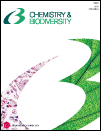
CHEMISTRY & BIODIVERSITY
Exploring the Nexus of Chemistry and Life.CHEMISTRY & BIODIVERSITY is a prominent peer-reviewed journal published by Wiley-V C H Verlag GmbH, serving as a vital resource in the intersecting fields of biochemistry, bioengineering, and miscellaneous chemistry. With an ISSN of 1612-1872 and an E-ISSN of 1612-1880, this journal has established itself over its converged years from 2004 to 2024 as a platform for innovative research that contributes significantly to the understanding of chemical processes in biological systems. The journal's impact is reflected in its category quartiles, particularly notable in Q2 in Chemistry and various Q3 and Q4 rankings across multiple related disciplines. While it is not an open-access publication, it continues to attract a diverse readership, including researchers, academics, and students, who are keen to explore the complexities of chemistry's role in biodiversity. Through high-quality articles and comprehensive reviews, CHEMISTRY & BIODIVERSITY plays an essential role in fostering advances in molecular biology and biochemistry, positioning itself as a key contributor to the ongoing discourse in the life sciences.
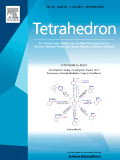
TETRAHEDRON
Connecting researchers with cutting-edge methodologies.TETRAHEDRON, published by Pergamon-Elsevier Science Ltd, is a leading peer-reviewed journal that has been pivotal in advancing the fields of Biochemistry, Drug Discovery, and Organic Chemistry since its inception in 1957. With an ISSN of 0040-4020 and an E-ISSN of 1464-5416, this journal provides a platform for the dissemination of cutting-edge research and innovative methodologies that contribute significantly to the scientific community. Recognized for its rigorous editorial standards, TETRAHEDRON has been categorized in the Q3 quartile for 2023 across its relevant fields, reflecting its solid impact within the scientific sphere. Despite the current absence of Open Access options, the journal continues to engage a diverse readership, offering invaluable insights and advancements that fuel both academic and industrial applications. With an ongoing commitment to excellence, TETRAHEDRON remains an essential resource for researchers, professionals, and students aiming to stay at the forefront of chemistry and biochemistry research.

CHINESE JOURNAL OF ORGANIC CHEMISTRY
Advancing Organic Chemistry Through Innovative ResearchThe Chinese Journal of Organic Chemistry, published by Science Press, serves as a pivotal platform for advancing the field of organic chemistry since its inception in 1996. With an ISSN of 0253-2786, this esteemed journal provides robust scientific contributions, reflecting significant advancements and novel findings that are crucial to the organic chemistry community. As of 2023, it is categorized in the Q3 quartile of organic chemistry journals, positioning it within the competitive landscape of this vibrant research area, ranking #147 out of 211 in Scopus, corresponding to a 30th percentile ranking. The journal is committed to fostering a scholarly exchange of ideas and research, making it an essential resource for researchers, professionals, and students dedicated to exploring the complexities and applications of organic compounds. The Chinese Journal of Organic Chemistry continues to support the dissemination of high-quality research that contributes to both local and global scientific endeavors.

RESEARCH ON CHEMICAL INTERMEDIATES
Unveiling Breakthroughs in Chemical ScienceRESEARCH ON CHEMICAL INTERMEDIATES, published by Springer, is a prestigious academic journal that has been contributing to the field of chemistry since 1984. With an ISSN of 0922-6168 and an E-ISSN of 1568-5675, this journal serves as a vital platform for the dissemination of innovative findings and research advancements related to chemical intermediates. Situated in the Netherlands, it has established a commendable reputation, currently ranked in the Q2 category for miscellaneous chemistry and positioned at #131/408 with a 68th percentile in the Scopus rankings. Though it does not operate under an open-access model, the journal plays a crucial role in connecting scientists, researchers, and practitioners to facilitate a better understanding of synthetic methods, characterizations, and applications of various chemical intermediates. Continually publishing high-quality research until its anticipated convergence in 2024, this journal is an essential resource for those looking to expand their knowledge and contribute to the vibrant community of chemical science.
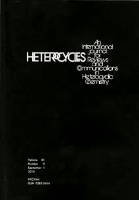
HETEROCYCLES
Exploring the Frontiers of Heterocyclic ChemistryHETEROCYCLES, published by the Japan Institute of Heterocyclic Chemistry, stands as a pivotal journal within the fields of Analytical Chemistry, Organic Chemistry, and Pharmacology. With its ISSN 0385-5414 and E-ISSN 1881-0942, HETEROCYCLES has been a respected platform for scholarly work since its establishment in 1983, featuring innovative research up until 2022. While currently not open access, the journal is renowned for its rigorous peer-review process, ensuring the dissemination of high-quality research. Despite its Q4 ranking in the 2023 quartiles for its categories, it plays a crucial role in bridging gaps in knowledge and advancing the discourse on heterocyclic compounds, which are vital in drug discovery and development. Researchers, professionals, and students who are engaged in chemistry and pharmacology will find HETEROCYCLES an essential source of cutting-edge studies, insights, and an opportunity to contribute to the evolving landscape of these scientific fields.

Carbohydrate Research
Exploring the intricate world of carbohydrate chemistry.Carbohydrate Research, published by Elsevier Science Ltd, stands as a pivotal platform for advancing the understanding of carbohydrate chemistry and its applications, with fine coverage extending from 1965 to 2024. This esteemed journal, with an ISSN of 0008-6215 and E-ISSN 1873-426X, is positioned in the Q2 category for Analytical Chemistry and Organic Chemistry, and Q3 for both Biochemistry and Medicine (miscellaneous) as of 2023, reflecting its substantial impact within these disciplines. With a Scopus rank placing it in the 58th and 57th percentiles for Analytical and Organic Chemistry respectively, Carbohydrate Research attracts a diverse readership including researchers, professionals, and students keen on exploring the latest developments in carbohydrate science. Though it operates under a traditional publishing model, the journal fosters a rich environment for scholarly communication and innovation in carbohydrate-related research, making it an invaluable resource for those committed to unraveling the complexities of this essential biomolecule.